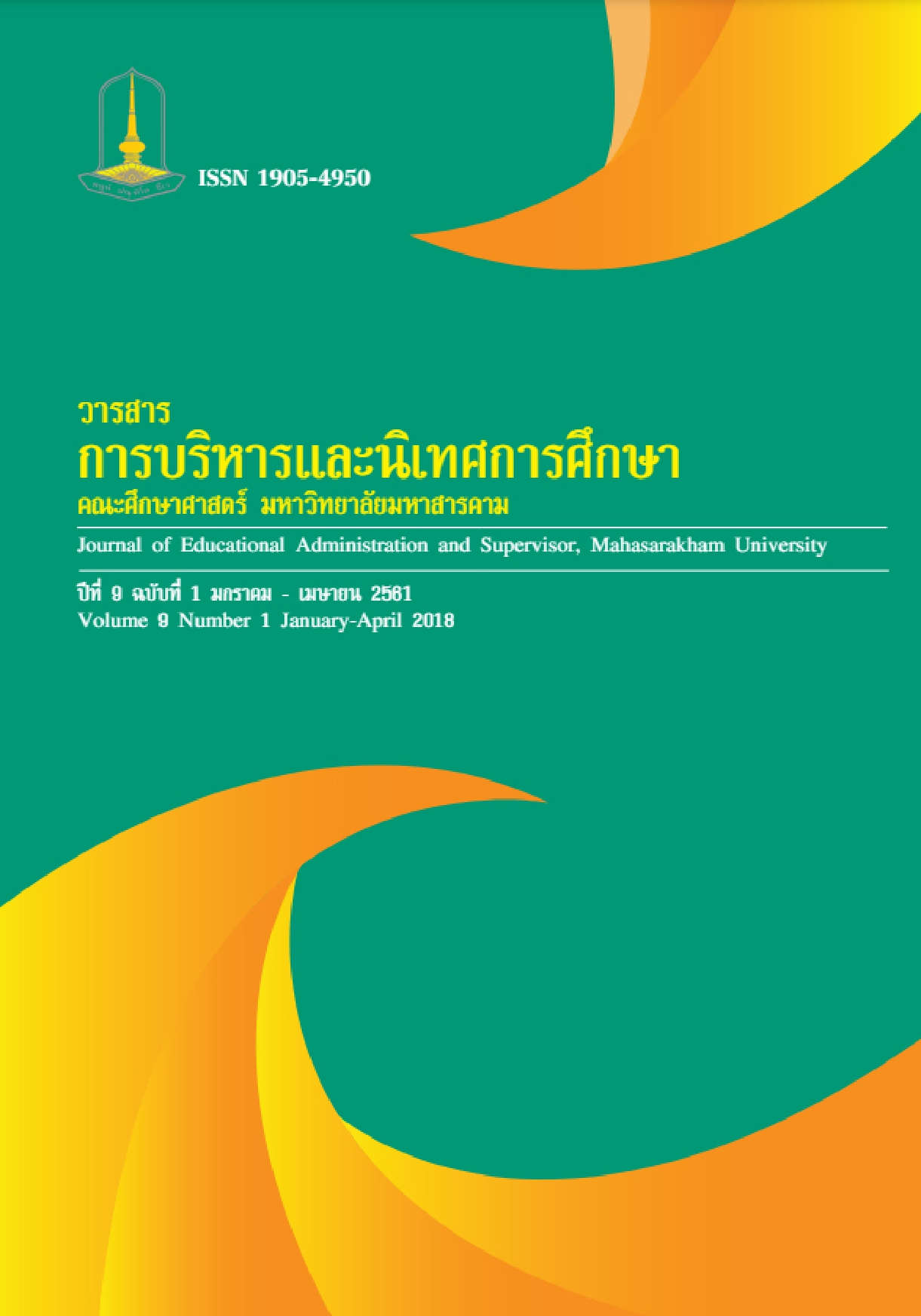Development of Learning Activity Based on Multiple Intelligences Theory with Electronics Book to Enhance Analytical Thinking in History Subject for Prathomsuksa 6 Level
Main Article Content
Abstract
The purposes of this study were: 1) to develop learning activity based on the multiple intelligences theory with electronics book to enhance analytical thinking in History Subject for Prathomsuksa 6 level with the established of efficiency criterion of 80/80, 2) to find out the effectiveness index of learning activity based on multiple intelligences theory with electronics book to enhance analytical thinking in History Subject, 3) to compare the students’ learning achievement between before and after learning based on multiple intelligences theory with electronics book in History Subject, 4) to compare the students’ analytical thinking between before and after learning based on multiple intelligences theory with electronics book in History Subject. The research sample was 28 students in Prathomsuksa 6 level from Ban Lard school, Muang District, NhongBualampoo Province, in the second semester of the academic year of 2014, and obtained using cluster random sampling technique. The instruments used for studying comprised of: 1) plans for learning activity based on multiple intelligences theory with electronics book with 9 plans, 2) the 30-item test for learning achievement of students with discriminating power of 0.35-0.69 and the reliability of 0.90, 4) the 20 item-test for analytical thinking of students with the difficulty of 0.46-0.65, the discriminating power of 0.29-0.76 and the reliability of 0.85. The statistics used for analyzing data were percentage, mean, standard deviation, and t-test (Dependent Samples) was employed for testing hypothesis.
The results of the study were as follows:
1. The learning activity based on the multiple intelligences theory with electronics book to enhance analytical thinking in History Subject for Prathomsuksa 6 level revealed the efficiency of 82.09/83.45, that higher than the established criterion of 80/80.
2. The effectiveness index of learning activity based on multiple intelligences theory with electronics book to enhance analytical thinking in History Subject for Prathomsuksa 6 level revealed at 0.5749.
3. The students who learned based on the multiple intelligences theory with electronics book in History Subject showed higher of learning achievement than before Learning at the .05 level of significance.
4. The students who learned based on the multiple intelligences theory with electronics book in History Subject showed higher of analytical thinking than before Learning at the .05 level of significance.
5. The result of analysis on qualitative data for analytical thinking of students, who learned based on the multiple intelligences theory with electronics book in History Subject, was found that the students showed in dialogue, explanation, and writing during learning activities. Which revealed on learning progress of students’ analytical thinking in prominent, associate, and principled elements, those grew up between learning activities.
Downloads
Article Details
References
กรมวิชาการ. (2545). เอกสารประกอบหลักสูตรการศึกษาขั้นพื้นฐานพุทธศักราช 2544 คู่มือการจัดการเรียนรู้กลุ่มสาระการเรียนรู้สังคมศึกษาศาสนาและวัฒนธรรม. กรุงเทพฯ: โรงพิมพ์องค์การรับส่งสินค้าและพัสดุภัณฑ์.
กระทรวงศึกษาธิการ. (2551). หลักสูตรแกนกลางการศึกษาขั้นพื้นฐานพุทธศักราช 2551. กรุงเทพฯ: โรงพิมพ์ชุมนุมสหกรณ์การเกษตรแห่งประเทศไทย.
นงคราญ พรหมสาขา ณ สกลนคร. (2552). ผลการจัดกิจกรรมการเรียนรู้ตามแนวทฤษฎีพหุปัญญาสาระเศรษฐศาสตร์กลุ่มสาระการเรียนรู้สังคมศึกษา ศาสนาและวัฒนธรรมชั้นประถมศึกษาปีที่ 5. การค้นคว้าแบบอิสระ กศ.ม. มหาสารคาม: มหาวิทยาลัยมหาสารคาม.
นิราศ จันทรจิตร. (2553). การเรียนรู้ด้านการคิด. มหาสารคาม: สำนักพิมพ์มหาวิทยาลัยมหาสารคาม.
บังอร เสรีรัตน์. (2543). เก่งหลากหลายแนวทางในการจัดการเรียนรู้เพื่อพัฒนาพหุปัญญา. กรุงเทพฯ: วัฒนาพานิช.
ประภาส หมั่นเรียน. (2555). ผลการจัดกิจกรรมการเรียนรู้กลุ่มสาระการเรียนรู้สังคมศึกษาศาสนาและวัฒนธรรมโดยประยุกต์ใช้ทฤษฎีพหุปัญญาเรื่องพัฒนาการทางประวัติศาสตร์สมัยอยุธยา ชั้นมัธยมศึกษาปีที่ 2. การค้นคว้าแบบอิสระ กศ.ม. มหาสารคาม: มหาวิทยาลัยมหาสารคาม.
พิศสวาท ศรีสะอาด. (2552). ผลการจัดกิจกรรมการเรียนรู้สาระสังคมศึกษาศาสนาและวัฒนธรรมสาระประวัติศาสตร์ตามแนวทฤษฎีพหุปัญญาเรื่องพัฒนาการทางประวัติศาสตร์สมัยอยุธยา ชั้นมัธยมศึกษาปีที่ 2. การค้นคว้าแบบอิสระ กศ.ม.มหาสารคาม: มหาวิทยาลัยมหาสารคาม.
รุ่งทิวา วิริยะสถิตย์. (2551). การเปรียบเทียบผลสัมฤทธิ์ทางการเรียน เรื่อง หน้าที่ประชาชนไทย การคิดอย่างมีวิจารณญาณ และความฉลาดทางอารมณ์ของนักเรียนชั้นมัธยมศึกษาปีที่ 2 ระหว่างการจัดการเรียนรู้ตามแนวทฤษฎีพหุปัญญากับการจัดการเรียนรู้แบบ Jigsaw. วิทยานิพนธ์ กศ.ม. มหาสารคาม: มหาวิทยาลัยมหาสารคาม.
วัชระ แจ่มจำรัส. (2549). การพัฒนาหนังสืออิเล็กทรอนิกส์ มัลติมีเดีย เสริมการอ่านออกเสียงภาษาอังกฤษ. วิทยานิพนธ์ กศ.ม. ชลบุรี: มหาวิทยาลัยบูรพา.
วิมลรัตน์ สุนทรโรจน์. (2550). การพัฒนาการเรียนการสอน. มหาสารคาม: ภาควิชาหลักสูตรและการสอนมหาวิทยาลัยมหาสารคาม.
สถาบันทดสอบทางการศึกษาแห่งชาติ. (2555). รายงานผลการทดสอบทางการศึกษาระดับชาติขั้นพื้นฐาน (O-NET) ชั้นประถมศึกษาปีที่ 6. กรุงเทพฯ: สถาบันทดสอบทางการศึกษาแห่งชาติ (องค์การมหาชน).
อารี สัณหฉวี. (2543). พหุปัญญาและการเรียนแบบร่วมมือ. กรุงเทพฯ: สำนักพิมพ์แว่นแก้ว, 2543.
Gardner, H. (1993). Multiple Intelligence: The Theory in Practice. New York: Basic Books.
Gardner, H. (1999). Intelligence Reframed: Multiple Intelligences for the 21th Century. NewYork: Basic Books.
Ong, Ai-Choo and Borich, Gary D. (2006). Teaching Strategies That Promote Thinking: Models And Curriculum Approaches. Singapore: McGraw-Hill Education.


